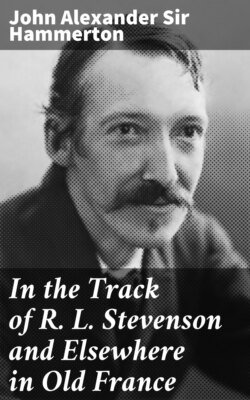Читать книгу In the Track of R. L. Stevenson and Elsewhere in Old France - John Alexander Sir Hammerton - Страница 7
IV.
ОглавлениеAlong our road were several picturesque patches formed of rock and pine, and notably the romantic ruins of Château Neuf, with the little village clustered at their roots, which furnished subjects for Stevenson's block and pencil. Among his efforts as a limner there has also been published a sketch of his that gives with striking effect the far-reaching panorama of the volcanic mountain masses ranging westward from Le Monastier, a scene of wild and austere aspect. A little beyond Château Neuf we were wheeling on the same road where he urged with sinking heart the unwilling ass, and while still within sight of his starting-place, showing now like a scar on the far hillside, we passed by the filthy village of St. Victor, the neighbourhood where the greenness of the donkey driver was diminished by the advice of a peasant, who advocated thrashing and the use of the magic word "Proot."
The road grew wilder as we advanced towards St. Martin de Frugères, to which village the sentimental traveller came upon a Sabbath, and wrote of the "home feeling" the scene at the church brought over him—a sentiment difficult to appreciate as we wandered the filth-sodden streets and inspected the ugly little church, whitewashed within and stuffed with cheap symbols of a religion that is anathema to descendants of the Covenanters. The silvery Loire far below in the valley to our right, we sat at our ease astride our wiry steeds and sped cheerfully down the winding road to Goudet, feeling that if our mode of progress was less romantic than Stevenson's, it had compensations, for there was nothing that tempted us to tarry on our way.
"Goudet stands in a green end of a valley, with Château Beaufort opposite upon a rocky steep, and the stream, as clear as crystal, lying in a deep pool between them." The scene was indeed one of singular beauty, the fertile fields and shaggy woods being in pleasant contrast to the barren country through which we had been moving. While still a mile away from the place, we foregathered with two peasants trudging uphill to St. Martin. I was glad to talk with them, as I desired to know which of the inns was the oldest. There were three, I was told, and the Café Rivet boasted the greatest age, the others being of recent birth, and none were good, my informant added, supposing that we intended to lodge for the night.
To the inn of M. Rivet we repaired, this being the only auberge that Goudet possessed at the time of Stevenson's visit. We found it one of the usual small plastered buildings, destitute of any quaintness, but cleaner than most, and sporting a large wooden tobacco pipe, crudely fashioned, by way of a sign. The old people who kept it were good Cevennol types, the woman wearing the curious headgear of the peasant folk, that resembles the tiny burlesque hats worn by musical clowns, and the man in every trait of dress and feature capable of passing for a country Scot. The couple were engagingly ignorant, and had never heard of Scotland, so it was no surprise to learn that they knew nothing of the famous son of that country who had once "hurried over his midday meal" in the dining-room where we were endeavouring to instruct Madame Rivet in the occult art of brewing tea. The Rivets had been four years in possession of the inn at the time of Stevenson's visit, and I should judge that the place had changed in no essential feature, though I missed the portrait of the host's nephew, Regis Senac, "Professor of Fencing and Champion of the Two Americas," that had entertained R. L. S. In return for our hints on tea-making, Madame Rivet charged us somewhat in excess of the usual tariff, and showed herself a veritable grippe-sous before giving change, by carefully reckoning the pieces of fly-blown sugar we had used, a little circumstance the cynic may claim as indicating a knowledge of the spirit if not the letter of Scotland.
